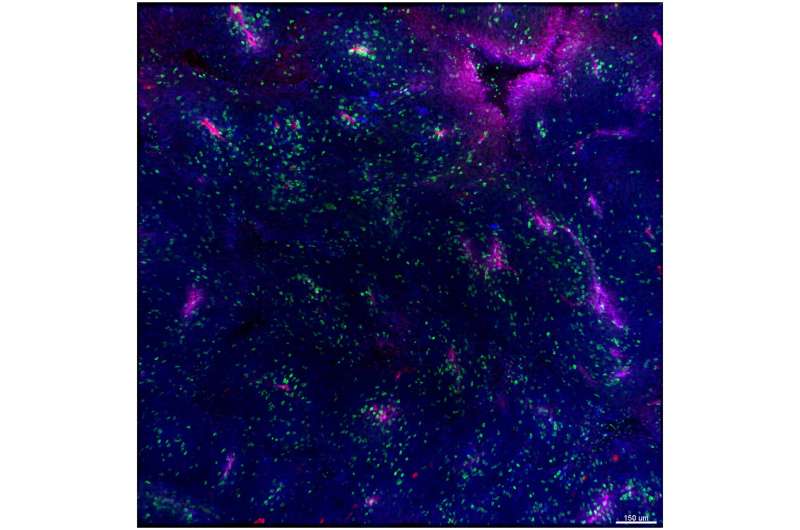This article has been reviewed according to Science X's editorial process and policies. Editors have highlighted the following attributes while ensuring the content's credibility:
fact-checked
peer-reviewed publication
trusted source
proofread
Rewiring tumor mitochondria enhances the immune system's ability to recognize and fight cancer

Immunotherapy, which uses the body's own immune system to fight cancer, is an effective treatment option, yet many patients do not respond to it. Thus, cancer researchers are seeking new ways to optimize immunotherapy so that it is more effective for more people.
Now, Salk Institute scientists have found that manipulating an early step in energy production in mitochondria—the cell's powerhouses—reduces melanoma tumor growth and enhances the immune response in mice.
The study, published in Science on September 21, 2023, revealed that when electrons take one of two initial routes through mitochondria, genes and proteins become activated that are needed for immune cells to recognize and kill tumor cells.
"We wanted to better understand how tumors acquire the metabolic state that gives them a growth advantage as well as an ability to evade the immune system, which I call the 'double whammy,'" says Professor Susan Kaech, the paper's co-senior author and director of the NOMIS Center for Immunology and Microbial Pathogenesis. "And we found a way to make the tumors more recognizable by the immune system and potentially more responsive to immunotherapy."
It was previously thought that cancer cells do not rely heavily on mitochondria despite still having oxygen and sugars available to them to fuel mitochondrial metabolism. This hypothesis dominated the field of cancer metabolism until recently, when scientists found that mitochondria actually play multiple important roles in tumor growth.
"There's an explosion of recent research activity from my lab and others revealing how mitochondria regulate the immune system and inflammation, and this study highlights an exciting new chapter in this story," says Professor Gerald Shadel, co-senior author, holder of the Audrey Geisel Chair in Biomedical Science, and director of the San Diego Nathan Shock Center of Excellence in the Basic Biology of Aging.
Kaech and Shadel teamed up to better understand how mitochondria influence both tumor growth and the way in which the immune system recognizes and responds to cancer. For this study, their labs altered a key step in the electron transport chain, a process that moves electrons through mitochondria, leading to the production of adenosine phosphate (ATP), the main energy-providing molecule in cells.
There are two primary routes by which electrons flow inside mitochondria to initiate ATP production. When the team forced electrons to primarily go through only one of these two routes, it led to the overproduction of a metabolite called succinate.
This accumulation of succinate led to expression of immune genes in the nucleus and increased the levels of a protein called MHC on the surface of the tumor. In turn, elevated levels of MHC made the tumor cells more visible to specialized immune cells called "killer" T cells, which recognize and eliminate cancer cells.
While the team knew that the metabolic state of tumor cells dictated their enhanced growth properties, this new finding shows that relatively simple manipulations to mitochondrial electron transport can convert a tumor that is evading immune detection into one that is now highly susceptible to immune system attack.
"We were surprised to find that mitochondrial activity determines how susceptible a tumor is to being recognized by the immune system," says co-first author Kailash Chandra Mangalhara, a senior research associate in Shadel's lab.
The researchers plan to explore ways to leverage this mechanism to fight cancer without harming mitochondria, which can have adverse effects on normal cells. They will continue to study the role of mitochondrial metabolism in cancer, immune responses, and immunotherapy efficacy.
"We think we found a novel mechanism by which antigen presentation in tumor cells is regulated," says co-first author Karthik Varanasi, a postdoctoral research associate in Kaech's lab. "These findings change how we now think about future treatment strategies."
More information: Kailash Chandra Mangalhara et al, Manipulating mitochondrial electron flow enhances tumor immunogenicity, Science (2023). DOI: 10.1126/science.abq1053. www.science.org/doi/10.1126/science.abq1053



















